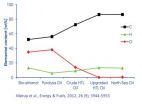(Press-News.org) LIBREVILLE, GABON (February 6, 2013): The Wildlife Conservation Society (WCS) announced today that a national park, once home to Africa's largest forest elephant population, has lost a staggering 11,100 individuals due to poaching for the ivory trade.
The shocking figures come from Gabon's Minkebe Park, where recent surveys of areas within the park revealed that two thirds of its elephants have vanished since 2004. The majority of these losses have probably taken place in the last five years.
Gabon contains over half of Africa's forest elephants, with a population estimated at over 40,000.
The surveys were conducted by WCS, WWF, and Gabon's National Parks Agency – Agence Nationale des parcs Nationaux (ANPN). The survey was funded by ANPN, the CITES MIKE (Monitoring the Illegal Killing of Elephants) Program, and the United States Fish and Wildlife Service.
"This sad news from Gabon confirms that without a global commitment, great elephant populations will soon become a thing of the past," said WCS President and CEO Cristián Samper. "We believe that elephants can still be saved – but only if nations greatly increase their efforts to stop poaching while eliminating the illegal ivory trade through better enforcement and reduced demand."
Until recently, Gabon's elephant herds were believed to be less impacted by poaching than in other parts of Africa, where according to the Born Free Foundation, an estimated 31,800 individuals were lost to poaching last year. However, Gabon's National Park Agency reported an uptick of poaching in recent years, including the 2011 slaughter of 27 elephants in a protected area just outside of the capitol.
In June 2011, a significant increase in human activity in the Minkebe National Park and its buffer zone was detected. A small camp of 300 artisanal gold miners had expanded to over 5,000 miners, poachers, and arms and drugs dealers. Park authorities estimated that 50-100 elephants were being killed daily as a result of increases in demand for ivory from the Far East and resulting price hike.
Since the survey results were announced, Gabon has stepped up its anti-poaching efforts seizing 20 tusks in the nation's capitol of Libreville and arresting poachers who had illegally entered the country from neighboring Cameroon. Gabon's National Park staff recently engaged in a firefight with armed poachers in Minkebe National Park after arresting two individuals carrying six tusks.
Gabon President Ali Bongo Ondimba announced that Gabon will pass new legislation to further dissuade commercial ivory poachers even more by increasing prison terms to a minimum of three years for ivory poachers and 15 years for poaching and ivory trafficking involving organized crime. Speaking in a cabinet meeting, the president urgently called for a strong, coordinated, and decisive response to this national emergency from all of the security and wildlife management services.
Lee White, head of the ANPN said: "Over the last three years we have deployed 400 additional parks staff, 120 soldiers and 30 gendarmes in our fight to stop illegal killing of elephants for the black market ivory trade. Despite our efforts we continue to lose elephants every day. If we do not turn the situation around quickly the future of the elephant in Africa is doomed. These new results illustrate starkly just how dramatic the situation has become. Our actions over the coming decade will determine whether these iconic species survive."
Richard Ruggiero, Chief of the Branch of the Near East, South Asia and Africa, Division of International Conservation, U.S. Fish & Wildlife Service, said: "We are working closely with the Gabonese authorities, who are showing true leadership, but this is a global problem and will require a global solution."
Mike Fay, the WCS explorer who played a key role in convincing the late Gabonese President Omar Bongo Ondimba to create a network of 13 national parks in 2002, said: "Conservation efforts in the Minkebe region have failed to react to the growing pressure of ivory poaching with tragic results. We need rethink how we do business and to act decisively if we are to save the elephant."
INFORMATION:
The Wildlife Conservation Society saves wildlife and wild places worldwide. We do so through science, global conservation, education and the management of the world's largest system of urban wildlife parks, led by the flagship Bronx Zoo. Together these activities change attitudes towards nature and help people imagine wildlife and humans living in harmony. WCS is committed to this mission because it is essential to the integrity of life on Earth. Visit www.wcs.org.
END
Until a child's bones have fully matured (in girls, typically by age 14; in boys, age 16), an injury to the anterior cruciate ligament (ACL)—the primary, stabilizing ligament of the knee joint—requires special consideration, treatment and care to ensure appropriate healing and to prevent long-term complications.
According to a review article in the February 2013 issue of the Journal of the American Academy of Orthopaedic Surgeons (JAAOS), ACL injuries once were considered rare in children and adolescents. However, the number of ACL injuries in young athletes is on the ...
A young woman in Tokyo pays 243,000 Yen for a Louis Vuitton suitcase emblazoned with the company's iconic monogram. A continent away, another woman purchases the same suitcase at the company's store on New York's 5th Avenue for the equivalent price in dollars, $3000. Why? What motivates their purchases? And, do those motivations hinge on their location?
That is precisely what Professor Jaehee Jung and her collaborators at universities in 9 other countries sought to answer. Their findings published recently in the journal, Psychology & Marketing, compared consumers' ...
The next advance in weather forecasting may not come from a new satellite or supercomputer, but from a device in your pocket. University of Washington atmospheric scientists are using pressure sensors included in the newest smartphones to develop better weather forecasting techniques.
"With this approach we could potentially have tens or hundreds of thousands of additional surface pressure observations, which could significantly improve short-term weather forecasts," said Cliff Mass, a UW professor of atmospheric sciences.
Owners of certain new Android smartphones and ...
Psychological well-being has been linked to many important life outcomes, including career success, relationship satisfaction, and even health. But it's not clear how feelings of well-being change as we age, as different studies have provided evidence for various trends over time.
A new report published in Psychological Science, a journal of the Association for Psychological Science, reveals that self-reported feelings of well-being tend to increase with age, but that a person's overall level of well-being depends on when he or she was born.
Psychological scientist ...
A tiny capsule invented at a UCLA lab could go a long way toward improving cancer treatment.
Devising a method for more precise and less invasive treatment of cancer tumors, a team led by researchers from the UCLA Henry Samueli School of Engineering and Applied Science has developed a degradable nanoscale shell to carry proteins to cancer cells and stunt the growth of tumors without damaging healthy cells.
In a new study, published online Feb. 1 in the peer-reviewed journal Nano Today, a group led by Yi Tang, a professor of chemical and biomolecular engineering and ...
A closer look at personalized or point-of-care healthcare was the focus of a recent international conference in India organized and chaired by NJIT Distinguished Professor Atam Dhawan. The IEEE Engineering in Medicine and Biology Society (EMBS) International Special Topic Conference in point-of-care healthcare technologies, broadcast around the world, focused on topics ranging from 21st century medicine with new smart cross-and trans-disciplinary technologies to how wireless communications will change how physicians care for patients.
"The last century witnessed a ...
As fibers go, there's never been anything quite like spider silk. Stretch it. Bend it. Soak it. Dry it out. Spider silk holds up. It is five times stronger than steel and can expand nearly a third greater than its original length and snap right back like new. Ounce-for-ounce spider silk is even stronger than Kevlar, the man-made fiber used in bulletproof vests.
It would be understandable to think that science knows all there is to know about the remarkable physics of spider silk, but the truth is far from that. Now, using a long-known-but-underutilized spectroscopy technique, ...
To emphasize, the HTL process accepts all biomasses from modern society – sewage sludge, manure, wood, compost and plant material along with waste from households, meat factories, dairy production and similar industries.
It is by far the most feedstock flexible of any liquid fuel producing process, including pyrolysis, bio-ethanol, gasification with Fischer-Tropsch or catalytic upgrading of different vegetable or agro-industrial residual oils, and does not carry higher costs than these.
Hydrothermal liquefaction is basically pressure cooking, but instead of cooking the ...
CAMBRIDGE, Mass. -- The peaks of the Himalayas are a modern remnant of massive tectonic forces that fused India with Asia tens of millions of years ago. Previous estimates have suggested this collision occurred about 50 million years ago, as India, moving northward at a rapid pace, crushed up against Eurasia. The crumple zone between the two plates gave rise to the Himalayas, which today bear geologic traces of both India and Asia. Geologists have sought to characterize the rocks of the Himalayas in order to retrace one of the planet's most dramatic tectonic collisions.
Now ...
UNIVERSITY PARK, Pa. -- Preserving genetically diverse local crops in areas where small-scale farms are rapidly modernizing is possible, according to a Penn State geographer, who is part of an international research project investigating the biodiversity of maize, or corn, in hotspots of Bolivia, Peru and Mexico.
Hotspots are areas where cultivation of peaches and other non-traditional crops has exploded over the past decade, noted Karl Zimmerer, professor and head of the Department of Geography, and where small-scale farms are often female-run and have been previously ...



